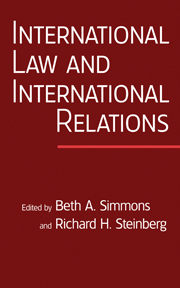Book contents
- Frontmatter
- Contents
- Contributors
- Abstracts
- Preface
- Editors' Note
- PART I INTERNATIONAL REGIMES THEORY: DOES LAW MATTER?
- PART II COMMITMENT AND COMPLIANCE
- PART III LEGALIZATION AND ITS LIMITS
- PART IV INTERNATIONAL LAW AND INTERNATIONAL NORMS
- PART V TREATY DESIGN AND DYNAMICS
- PART VI LAW AND LEGAL INSTITUTIONS
- PART VII OTHER SUBSTANTIVE AREAS OF INTERNATIONAL LAW
- 20 Security: Scraps of Paper? Agreements and the Durability of Peace (2003)
- 21 Trade: In the Shadow of Law or Power? Consensus-Based Bargaining and Outcomes in the GATT/WTO (2002)
- 22 Money: The Legalization of International Monetary Affairs (2000)
- 23 War Crimes: Constructing an Atrocities Regime: The Politics of War Crimes Tribunals (2001)
- 24 Human Rights: The Origins of Human Rights Regimes: Democratic Delegation in Postwar Europe (2000)
- 25 Environment: Regime Design Matters: Intentional Oil Pollution and Treaty Compliance (1994)
- 26 Intellectual Property: The Regime Complex for Plant Genetic Resources (2004)
- References
- Index
22 - Money: The Legalization of International Monetary Affairs (2000)
Published online by Cambridge University Press: 05 June 2012
- Frontmatter
- Contents
- Contributors
- Abstracts
- Preface
- Editors' Note
- PART I INTERNATIONAL REGIMES THEORY: DOES LAW MATTER?
- PART II COMMITMENT AND COMPLIANCE
- PART III LEGALIZATION AND ITS LIMITS
- PART IV INTERNATIONAL LAW AND INTERNATIONAL NORMS
- PART V TREATY DESIGN AND DYNAMICS
- PART VI LAW AND LEGAL INSTITUTIONS
- PART VII OTHER SUBSTANTIVE AREAS OF INTERNATIONAL LAW
- 20 Security: Scraps of Paper? Agreements and the Durability of Peace (2003)
- 21 Trade: In the Shadow of Law or Power? Consensus-Based Bargaining and Outcomes in the GATT/WTO (2002)
- 22 Money: The Legalization of International Monetary Affairs (2000)
- 23 War Crimes: Constructing an Atrocities Regime: The Politics of War Crimes Tribunals (2001)
- 24 Human Rights: The Origins of Human Rights Regimes: Democratic Delegation in Postwar Europe (2000)
- 25 Environment: Regime Design Matters: Intentional Oil Pollution and Treaty Compliance (1994)
- 26 Intellectual Property: The Regime Complex for Plant Genetic Resources (2004)
- References
- Index
Summary
Sovereign control over money is one of the most closely guarded national prerogatives. Creating, valuating, and controlling the distribution of national legal tender is viewed as an inherent right of a nation-state in the modern period. Yet over the course of the twentieth century, international rules of good monetary conduct have become “legalized” in the sense developed in this volume. This historic shift took place after World War II in an effort to bolster the confidence that had been shattered by the interwar monetary experience. If the interwar years taught monetary policymakers anything, it was that economic prosperity required credible exchange-rate commitments, open markets, and nondiscriminatory economic arrangements. International legalization of monetary affairs was a way to inspire private actors to once again trade and invest across national borders.
The Bretton Woods institutions involved only three international legal obligations regarding the conduct of monetary policy. The best known of these was to establish and maintain a par value, an obligation that was formally eliminated by the Second Amendment to the International Monetary Fund's (IMF) Articles of Agreement in 1977. But two other obligations remain: to keep one's current account free from restrictions, and to maintain a unified exchange-rate system. The first requires that if a bill comes due for imports or an external interest payment, national monetary authorities must make foreign exchange available to pay it. The second proscribes exchange-rate systems that favor certain transactions or trade partners over others.
- Type
- Chapter
- Information
- International Law and International RelationsAn International Organization Reader, pp. 568 - 593Publisher: Cambridge University PressPrint publication year: 2007

